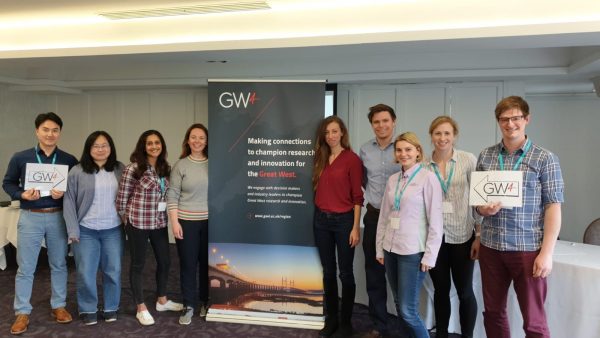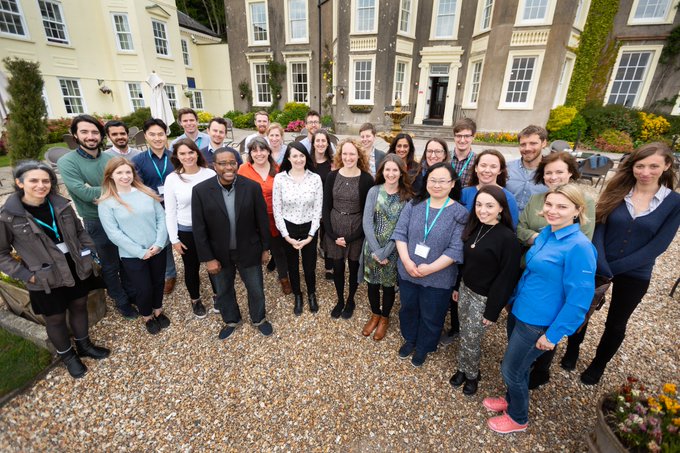NIHR Doctoral Fellowship: Interview with Tim Pickles
8 October 2019
Tim Pickles is a statistician and NIHR Doctoral Fellow in the Centre for Trials Research, a UKCRC-registered clinical trials unit based at Cardiff University. Here he talks about his Fellowship journey so far, and his ambitions for the future.
Background
What Fellowship was awarded?
I have been awarded an NIHR Doctoral Fellowship and started on 1st October 2019. This is a 3-year full-time Fellowship supported by a National Institute of Health Research (NIHR) Doctoral Fellowship, funded by the Welsh Government through Health and Care Research Wales (NIHR-FS-19).
Can you give bit of background to your study or research?
My Fellowship will focus on validating items from Patient Reported Outcome Measures (PROMs) for Rheumatoid Arthritis (RA) Symptom Severity using Rasch measurement theory, with the end goal to develop a computer adaptive test.
I will analyse data from international cohorts, and from local patients, to determine which items from existing PROMs can form an item pool and will assess the face validity in discussion with RA patients. I will then co-calibrate the item pool to develop an item bank. Lastly, I will design and build a prototype CAT, including initial user testing with patients.
Who supported you in that?
I am supervised by Professor Ernest Choy, who I have been working with in the Cardiff Regional Experimental Arthritis Treatment and Evaluation (CREATE) Centre since 2014. Through training courses on Rasch measurement theory, I met Dr Mike Horton, who is Director at the Psychometric Laboratory for Health Sciences at the University of Leeds, and Professor Karl Bang Christensen of the University of Copenhagen, who both agreed to supervise me. Dr Rhiannon Phillips of Cardiff Metropolitan University is supervising on the qualitative aspects and Dr David Gillespie is supervising on the future trial potential of this methodological work
How did being in the Centre enable you to achieve this?
My role in the Centre for Trials Research has allowed me to operate 50% on trials and 50% working with Professor Choy in the CREATE Centre. I was granted CREATE time to develop the application for this Fellowship with my supervisors, which was vital as there I would not have been able to write this application in addition to my role. The idea for the research in this application has sprung from a set of analyses I’ve been able to undertake in the Centre starting with classical test theory of quality of life measures from the DEPICTED trial to undertaking Rasch analyses for a MSc dissertation hosted here. The Centre for Trials Research has agreed to host me for this Fellowship, which means I have access to statistical, qualitative, trial management, data management and information systems colleagues, as well as others undertaking Ph.D.s and Fellowships.
Application Process
What was your personal motivation for applying?
I have long wanted to do a Ph.D. to further my academic career. However, I am at the stage of my life where I can’t afford to take the financial hit of doing it via a student stipend and paying fees. I was inspired by the example of my Centre for Trials Research colleague Vicky Shepherd who achieved and recently completed a Fellowship, so I knew it could be done. NIHR fellowships are highly prestigious and the doctoral fellowship is one of the few in this field that allows for the research to be attributed to a Ph.D., so I knew this was where I needed to target my efforts.
What kind of process was it?
The process requires an initial, almost complete, application in December. If you are deemed successful in April then further sections (PPI, full budget breakdown and the SOECAT) must be submitted quickly and you are invited to interview in June. This entailed a 5-minute presentation and then questioning on your application, largely from 2 members of the 15-person panel.
What was the application process like?
This was my first time leading an application process – I have been part of the team submitting to Health Technology Assessment (HTA) and Research for Patient and Public Benefit (RfPPB) before – so this was all new to me. Thankfully, the group of supervisors were wonderful in helping me, as were the School of Medicine Research Office, and I really enjoyed the process. It is more than a standard grant because, despite any support I get, the award is to fund me (and it was cringeworthy to write ‘I’ throughout the application rather than ‘we’) so sections on training and development and personal success criteria had to be included.
How long did the process take?
I have documents on this idea going back to May 2017 but the work started in earnest in May 2018. From there, I had regular meetings with my supervisors to help shape the application.
When did you find out you were successful?

I found out on July 23rd 2019 that I was successful at interview, subject to adding a formal qualitative research methods course to my training and development. Given how linked my Fellowship and the GW4 Crucible were, it was ironic that I found out whilst I was on Crucible follow-on event where our group also found out that we were successful. I was very pleased that event had a free bar!
Fellowship
Why did you choose this area to focus on in your Fellowship? What got you interested in it?
I long had an idea that I could do a Fellowship based around Rasch measurement theory. Work in the CREATE Centre led me to discover that there was a need to apply this to measures of symptom severity in Rheumatoid Arthritis. Through training courses and supervisor discussion, I realised the possibility of developing a computer adaptive test, which could help with many other issues that exist within RA, such as the lack of regular monitoring.
What is your Fellowship topic / general area / Specific areas of interest etc?
This Fellowship is based around Patient Reported Outcome Measures and Rasch measurement theory in the field of Rheumatoid Arthritis.
What did you choose this topic?
I have been interested in Rasch measurement theory since undertaking my MSc dissertation, which I completed in 2013.
What are the particular challenges you are likely to face?
The main challenge will be that this will be my first time leading any research, so I will need to get to grips with ethics applications and there are multiple qualitative aspects, so I have to learn from the absolute bottom up. It is a training Fellowship though so I am not discouraged by this rather daunting prospect.
What are your plans for the first few months?
I need to ensure I have the requisite data from international cohorts in Austria and Canada. This effects the ethics application for data collection from Cardiff and Vale patients and qualitative interviews and the questionnaires I need to design. I have a training course in Rasch measurement theory that starts in October and I hope to attend the NIHR Academy Members’ Conference in November.
The Future
What is the relationship with GW4 and your Fellowship?
I used my Fellowship application as the basis of my application to the GW4 Crucible on Digital Innovation (as the end game of this Fellowship is a computer adaptive test that can be used as the basis of an app for RA patients to self-monitor their disease). I was fortunate to end up collaborating with others on the Crucible interested in novel health technologies (including virtual reality, microwave diabetes monitors and laser optic techniques) and we are going to investigate perceptions and attitudes towards these over the 7 months.
What are you intending to do with this Fellowship once you’ve successfully completed it?
I hope to successfully defend my Ph.D. and will then look to apply for an NIHR Advanced Fellowship to develop the computer adaptive test from this Fellowship into a complex intervention and then undertake feasibility trialling.
- June 2024
- May 2024
- April 2024
- March 2024
- December 2023
- November 2023
- September 2023
- July 2023
- June 2023
- April 2023
- March 2023
- February 2023
- December 2022
- November 2022
- October 2022
- September 2022
- August 2022
- July 2022
- June 2022
- May 2022
- April 2022
- March 2022
- February 2022
- January 2022
- November 2021
- September 2021
- July 2021
- June 2021
- May 2021
- March 2021
- February 2021
- December 2020
- November 2020
- September 2020
- August 2020
- July 2020
- January 2020
- December 2019
- October 2019
- September 2019
- July 2019
- June 2019
- May 2019
- April 2019
- February 2019
- December 2018
- November 2018
- October 2018
- September 2018
- August 2018
- July 2018
- June 2018
- May 2018
- April 2018
- March 2018
- December 2017
- October 2017
- August 2017
- July 2017
- June 2017
- May 2017
- April 2017
- March 2017
- February 2017
- January 2017
- December 2016
- October 2016
- August 2016
- June 2016
- April 2016
- March 2016
- February 2016